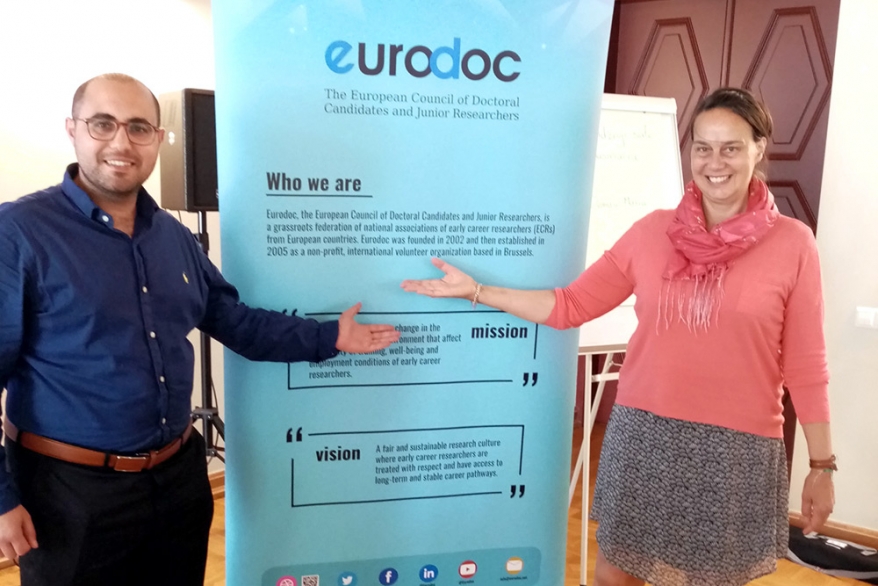Photo legend: Thesis Eurodoc Delegates, German NA
Who we are. Our Thesis Members.
Founded: 1992 by PhD candidates, interdisciplinary, independent, Germany-wide network for Doctoral candidates and Doctorate Holders;
Thesis e.V: registered association (German association law); NGO
Eurodoc founding member: 2002 in Gerona, Spain;
Our association is still interdisciplinary in composition; a large part is provided by the humanities, social or cultural sciences. The department of economics is also strongly represented. But in the committee, physicists meet archaeologists, computer scientists meet historians or sociologists meet traffic planners! In total, more than eighty subjects (the designations are not always clear and uniform) can be identified at Thesis. In the meantime, members have been awarded a doctorate by Thesis, so to speak, and one third of our Thesians hold their doctorate, thus, our Thesis members show an age range of over 30 years. In addition, the largest part of the group belongs to the so-called “external” doctoral candidates — and we also count the externally employed doctoral candidates among them: a diverse group consisting of fellows, industrial doctorates, the doctoral candidates of the large research institutions and self-funding doctoral candidates. An equally growing group is that of doctoral candidates from HEI (formerly universities of applied sciences of any kind). And finally, there are those who represent “Doctoral candidates in professional life”, Thesians who want to know it again, generate a research thesis from their work environment and their expertise. Compared to the university-employed doctoral candidates and postdocs as well as the members of the graduate schools, the group of externals is ten times larger, but so far publicly unknown, little involved and thus hardly represented.
Our Thesis Committees.
In addition to the board, various experts have been elected to the Thesis Federal Committee (extended board). They deal with university politics, social media, there is a webmaster area and we can now also cover the extremely important topic of Mental Health! An elected advisory board supports the board and the federal committee with words and deeds. For a nationwide association, certainly, the work on site must not be missing: Regulars’ table leaders ensure personal contact and exchange. Guests are always welcome! Furthermore, we have an editorial office of our association magazine, THESE, and an office as administrative basis. We do our work on a voluntary basis, and, in many cases, personal experiences and the urge for change have shaped the active and visible work of the association.
Thesis for Thesians.
A registered NGO brings many tasks with it, which are regulated by the statutes and the rules of the association. In addition to the annual general meeting (AGM, which took place online since 2020), at which the committee representatives are elected and contents and goals are discussed, the Thesis Association publishes a magazine, the THESE, three times a year, in which internal areas of the association are published, but also research, science, teaching, self-employment and much more are presented by the Thesians. The internal newsletter informs about important and scheduled events, and various platforms invite to interest-based debates. Traditionally, the AGM is accompanied by a day with workshops and exchange of topics, external speakers talk about current topics. In times of Corona, we were taking a step further: our Symposium, which was unfortunately postponed due to Corona, was then (“was then”/ or — “has now been” combined with the AGM 2021. One day was dedicated to the topic of mental health — and to networking. Time changes — tasks change!
Our association work at Thesis.
The second pillar of our association’s work, in addition to our internal network, is our involvement in higher education policy, which can vary greatly depending on the topic, but also on the personal interests of the officials. We try to make our statements and comments visible in the current discussions on higher education policy and also enter into co-operations with other stakeholders and science-related organisations — because together we move more! These important co-operations, which often last for years, are the result of personal exchanges between the board and other committee members (who, by the way, continue to be active beyond their term of office) at conferences, workshops, annual meetings, and during Corona’s numerous online events. The representatives of Thesis are invited here regularly and reliably — because of our work.
The goals of Thesis e.V.
There is still a lot to be done for the group of doctoral candidates and postdocs, which is becoming more and more differentiated but also finally more self-confident. The supervision conditions as well as the peer review are still in-transparent. Precarious conditions (#ichbinhanna and Fixed-Term Academic Contracts Act), the issue of occupational health and safety (physical, psychological stress: Thesis-Symposium 2021-22), which has received little attention to date, and the much-discussed issue of career and family planning are also on the agenda. Doctoral candidates are no longer students, they are scientists whose term “junior staff” has little respect and is somewhat unserious. The establishment of interdisciplinary, university-owned graduate centres, which is being eagerly promoted in many places, is certainly one way to align many of the familiar tasks in an interdisciplinary way and to make the future attractive and viable for the young, new, committed scientists at the universities.
Authors: Claudia S. Dobrinski, Dr. Aziz Ben-Miled, Katharina Müller, and Dr. Gereon Schüller
Learn more about Thesis and their work:
- Facebook: https://www.facebook.com/THESIS.netzwerk
- Twitter: https://twitter.com/THESIS_eV
- LinkedIn: https://www.linkedin.com/company/thesis-e.v./
- Instagram: https://www.instagram.com/thesis_ev/

